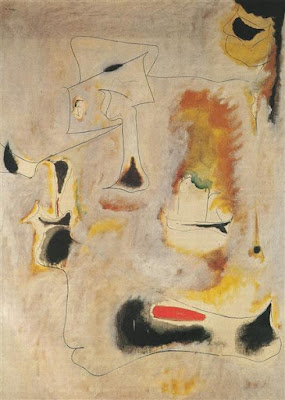by Yoga Studio
 |
| The Observer by Arshile Gorky |
Still it was only this morning that I realized how yoga fit into the picture. I’ve written about the niyama svadhyaya (self study) in the past The Power of Svadhyaya (Self Study), Part 1
and The Power of Svadhyaya (Self Study), Part 2, saying it meant both study of the scriptures and study of yourself by using your witness mind. So I’m going to go out on a limb today and say that using your witness mind to notice what triggers you is a yogic self-study practice. I’ll use myself as an example.
During my bout of agitated depression, even when I was on medication I was having a hard time recovering. I still felt like I was on the very edge of a break down (see Walking Away from the Edge ) and was barely getting through each day. Then one day I had a lunch date with an old friend at a restaurant he specified as “the Japanese sushi restaurant on Solano.” I asked if he was sure it was open for lunch because I didn’t think it was, and he said he was sure, so we agreed to meet at noon in front of the rest. I walked over there, giving myself the right amount of time to arrive at noon, but when I got there, the restaurant was closed and my friend was not in sight. Those were the days before cell phones so I had no way of getting in touch with him. I waited for around 10 minutes or so, and he still didn’t show (he’s an on-time person). Eventually it dawned on me that maybe he meant a different Japanese restaurant, one that was several blocks away at the bottom the hill. So I decided I would run down the hill to see if he was waiting for me for me. And when I say “run,” I mean RUN. And indeed he was there, and I explained the mix up, and we did have lunch together. But things did not go well for me. In fact, I felt utterly crazy after that, in a way I’d never felt before—not just hyper but CRAZY.
The next day I called my therapist (a psychologist I greatly admired) and he gently said that he guessed that if I had not run down the hill that day (adding more adrenaline to my over-stimulated nervous system), he thought the entire day would have gone differently for me. That was a huge epiphany for me. I even began to use it as a mantra for myself “You don’t need to run down the hill.” It became a metaphor for everything. Even though I’m always on time, if I had to be late, it would be okay. Even though I like to finish everything I start, it would be okay if I wasn’t able to. Even if I couldn’t get everything done I planned to, it would be okay. I even told my boss about my problem (he was a big admirer of my work and a good friend) and said that if he gave me an unrealistic deadline, I was going to negotiate with him about it, and would no just to agree to whatever he asked for (and he consented!). In other words, I realized in general that pushing myself too hard to meet certain expectations was a trigger, and it was very important for me when I was already stressed to never “run down the hill.”
And I began to use my witness mind to observe what the physical symptoms I was having that indicated it was time to back off (see Walking Away from the Edge) and refrain from running down hills (which, of course, is sometimes perfectly fine). I noticed when I was very stressed I not only had trouble sleeping, but my appetite wasn’t normal, I talked a lot more than usual, and the most important sign of all was a burning feeling in my chest that I called the "adrenaline burn," which mean things were getting really serious.
So today I just want to say that if you’re struggling with depression and/or anxiety, consider working with your witness mind to start learning what triggers your bad episodes. Observe both your thought patterns and your physical symptoms. Yoga Studio has written a wonderful post Working with the Witness about learning to work with your witness mind. Although her perspective in that post is about aging, these techniques can also apply to anyone who is engaging in self study to help manage or heal from emotional illnesses.
As I wrote in my post The Power of Svadhyaya (Self Study), Part 1:
“Eventually you can use on your witness mind during any activity. In my post Mental Yoga: Thataashut I wrote about using my witness mind when I was trying to write a blog post while construction was going on outside my window. Observing my thought patterns helped me calm down and find some peace of mind even with people arguing outside and making the kind of invasive noise that only large machines are capable of. Observing your habits can help you change the way you react to stress (see Changing the Brain's Stressful Habits). And it can help you in general to change your patterns of reactivity (see Meditation and Brain Strength).
All of this will help you cultivate equanimity in your daily life, and if you’re suffering from anxiety and/or depression it may help you learn about and avoid triggers that worsen your condition.
Subscribe to Yoga for Healthy Aging by Email ° Follow Yoga for Healthy Aging on Facebook ° Join this site with Google Friend Connect










